H I G H L I G T H
New associates
Faculty of Sciences and Polytechnical Institute in synergy with INESC Porto 
INESC Porto’s invitation to new companies and institutions to join it was one of the decisions taken in the General Council, which took place last April 3rd. INESC Porto’s Board informed the General Council about some initiatives already carried out towards the membership, as associates of INESC Porto, the Faculty of Sciences and the Polytechnical Institute of Porto (the latter had already begun some time ago). It was decided that the associates would address an invitation to the institutions mentioned. After that invitation, the Board should negotiate the terms of accession. The admission of new associates was faced as a strategic reason rather than as a need to reinforce associative capital.
The Institute’s story
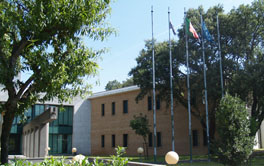 The Polytechnical Institute of Porto (IPP) was founded in 1985 and is a result of the relaunching of the Polytechnical Higher Education in Portugal, started in 1979. The Schools that first integrated IPP were School of Education (ESE) and School of Music (ESM) which, later, with the creation of a Theatre Department, was called School of Music and Performing Arts (ESMAE). Currently, IPP aggregates five more schools: the Institute of Engineering (ISEP), the Institute of Accountance and Administration (ISCAP), the School of Industry and Management (ESEIG), the Felgueiras School of Technology and Management (ESTGF) and the School of Health Technologies (ESTSP), integrated in July 2004. The Polytechnical Institute of Porto (IPP) was founded in 1985 and is a result of the relaunching of the Polytechnical Higher Education in Portugal, started in 1979. The Schools that first integrated IPP were School of Education (ESE) and School of Music (ESM) which, later, with the creation of a Theatre Department, was called School of Music and Performing Arts (ESMAE). Currently, IPP aggregates five more schools: the Institute of Engineering (ISEP), the Institute of Accountance and Administration (ISCAP), the School of Industry and Management (ESEIG), the Felgueiras School of Technology and Management (ESTGF) and the School of Health Technologies (ESTSP), integrated in July 2004.
Nine years after its foundation, and using the autonomy the law grants the University and Polytechnical institutions, IPP carried out and approved its Statutes in 1995, defining its mission and goals. Its seven schools are gifted with scientific, educational, administrative and financial autonomy.
BIP interviewed Luis Soares, President of the Polytechnical Institute of Porto and Baltazar de Castro, director of the Faculty of Sciences of the University of Porto (FCUP), to find out how that cooperation is an asset for both institutions.
BIP: Why didn’t the cooperation between the Polytechnical Institute and INESC Porto happen sooner?
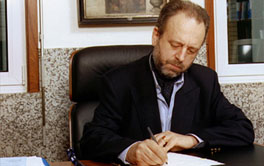 Luis Soares: (President of IPP): INESC Porto and the Polytechnical Institute have been cooperating for many years now. Actually, there have been many professors who, along the years, have been collaborating with INESC, and later, INESC Porto, under a protocol of cooperation existing between both institutions. Luis Soares: (President of IPP): INESC Porto and the Polytechnical Institute have been cooperating for many years now. Actually, there have been many professors who, along the years, have been collaborating with INESC, and later, INESC Porto, under a protocol of cooperation existing between both institutions.
So, the admission of the Polytechnical Institute as an associate corresponds only to a change in the legal and institutional framing of a long-lasting cooperation. The change in that framing translates the recognition of cooperation of the teachers working in INESC Porto. It occurred in due time, as a result of the fact that the cooperation and intervention of the Institute as an associate would be an advantage to both institutions, considering the experience of a long cooperation.
BIP: What does that cooperation with INESC Porto mean to IPP?
Luis Soares (President of IPP): The integration as an associate is also a part of the IPP’s strategic orientation towards the organization of its activities of research and development, privileging the establishment of networks, whether national or international. These should enable the development of those activities, through the professors in the institution, coming from its progressive academic qualification and increase of the projects of research and development they work in.
Short history of FCUP
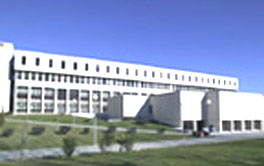 The Faculty of Sciences (FCUP) is, since its foundation, in 1911, the school in the University of Porto that teaches Exact and Natural Sciences. Along the years, the teaching in this faculty has been followed closely by activities of research and development, which makes it possible to consolidate the scientific rigor that characterizes its activity of training at both graduate and post-graduate levels. The Faculty of Sciences (FCUP) is, since its foundation, in 1911, the school in the University of Porto that teaches Exact and Natural Sciences. Along the years, the teaching in this faculty has been followed closely by activities of research and development, which makes it possible to consolidate the scientific rigor that characterizes its activity of training at both graduate and post-graduate levels.
The Faculty of Sciences, the only one that offers degrees in Maths, Physics, Chemistry, Biology and Geology, presents a transdisciplinary approach in teaching-learning in order to ensure a training which is adequate to the demands and expectations of the modern world. Thus, there are now degrees in more technical areas, with an obvious emphasis on technology, while others gather transversal competences, such as Engineering in Network and Computer Systems and Environmental Sciences and Technologies.
BIP: We know the Faculty of Sciences was at the start of INESC Porto. How did it all begin?
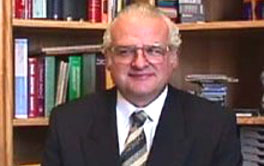 Baltazar de Castro (director of FCUP): In the beginning of the 80s, a group of professors of the Physics Department, namely Manuel de Barros, Pereira Leite and José Salcedo, decided to propel the R&D activity in Optoelectronics in FCUP, in the line of what was happening in England and in the United States, where they had carried out their PhDs. Baltazar de Castro (director of FCUP): In the beginning of the 80s, a group of professors of the Physics Department, namely Manuel de Barros, Pereira Leite and José Salcedo, decided to propel the R&D activity in Optoelectronics in FCUP, in the line of what was happening in England and in the United States, where they had carried out their PhDs.
At the time, an area with explosive growth in the international context was the optical fiber communication one. In this context, the professors mentioned considered that was the way to go. In order to obtain the necessary funding to the beginning of the activity, we were able to get INESC’s support, lead by Prof.Tribolet, and founded in 1980. The projects took place in the FCUP’s facilities and enabled the creation of work teams as well as critical and dynamic mass for more ambitious developments.
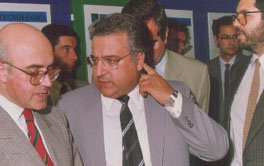 In 1984, the political conditions for the negotiation of a big project in the area of optical communication were gathered. The professors of FCUP and colleagues of FEUP came up with the tender for that project, named SIFO (Optical Fiber Integrated Systems), approved with a substantial fund (higher than five million euros). That project made way for the institutional and financial circumstances which led to the creation of INESC Porto, in May 1985. In 1984, the political conditions for the negotiation of a big project in the area of optical communication were gathered. The professors of FCUP and colleagues of FEUP came up with the tender for that project, named SIFO (Optical Fiber Integrated Systems), approved with a substantial fund (higher than five million euros). That project made way for the institutional and financial circumstances which led to the creation of INESC Porto, in May 1985.
It is thus clear that FCUP was at the start of INSC Porto. Through its professors and post-graduate students, it has been involved in the R&D activity of the institution, especially in the area of optoelectronics, which has been developed in laboratories of the Faculty of Sciences of the University of Porto.
BIP: Why didn’t the cooperation between the Polytechnical Institute and INESC Porto happen sooner?
Baltazar de Castro (Director of FCUP): As mentioned above, the cooperation between FCUP and INESC Porto has happened since the beginning, only not in a formal way. Today, it is hard to understand why that didn’t happen, even because there were never concrete reasons that prevented that formalization from happening. Anyway, the important thing is that is happening now, clearly indicating the commitment of both institutions in this project of framing of R&D and technology transfer activities.
BIP: What does that cooperation with INESC Porto mean to IPP?
Baltazar de Castro (Director of FCUP): The formal cooperation between FCUP and INESC Porto will lead to the mutual knowledge of their development strategies, and, whenever possible, to its articulation. There are notorious benefits in this for which it is reasonable to expect results with added value in relation to what has been achieved until now.
The reinforcement of the feeling of belonging
 According to Graça Barbosa (DIL), “the main asset of the aggregation of FCUP and IPP to INESC Porto is the consolidation of the relationships that have been establishing for a long time now and the reinforcement of the feeling of belonging of researchers of those institutions that collaborate in INESC Porto’s activities. In a more pragmatic perspective, the fact that the researchers work in an associate of INESC Porto increases the legitimacy of its participation in activities and projects of INESC Porto According to Graça Barbosa (DIL), “the main asset of the aggregation of FCUP and IPP to INESC Porto is the consolidation of the relationships that have been establishing for a long time now and the reinforcement of the feeling of belonging of researchers of those institutions that collaborate in INESC Porto’s activities. In a more pragmatic perspective, the fact that the researchers work in an associate of INESC Porto increases the legitimacy of its participation in activities and projects of INESC Porto
It seems the interest these institutions showed in joining INESC Porto demonstrates they believe in the project INESC Porto and intend to have a say in the way it is conducted. It will be so, because every one of them will appoint a member for INESC Porto’s General Council, who will now take part in the most important decisions of this institute. |


 The Polytechnical Institute of Porto (IPP) was founded in 1985 and is a result of the relaunching of the Polytechnical Higher Education in Portugal, started in 1979. The Schools that first integrated IPP were School of Education (ESE) and School of Music (ESM) which, later, with the creation of a Theatre Department, was called School of Music and Performing Arts (ESMAE). Currently, IPP aggregates five more schools: the Institute of Engineering (ISEP), the Institute of Accountance and Administration (ISCAP), the School of Industry and Management (ESEIG), the Felgueiras School of Technology and Management (ESTGF) and the School of Health Technologies (ESTSP), integrated in July 2004.
The Polytechnical Institute of Porto (IPP) was founded in 1985 and is a result of the relaunching of the Polytechnical Higher Education in Portugal, started in 1979. The Schools that first integrated IPP were School of Education (ESE) and School of Music (ESM) which, later, with the creation of a Theatre Department, was called School of Music and Performing Arts (ESMAE). Currently, IPP aggregates five more schools: the Institute of Engineering (ISEP), the Institute of Accountance and Administration (ISCAP), the School of Industry and Management (ESEIG), the Felgueiras School of Technology and Management (ESTGF) and the School of Health Technologies (ESTSP), integrated in July 2004.  Luis Soares: (President of IPP): INESC Porto and the Polytechnical Institute have been cooperating for many years now. Actually, there have been many professors who, along the years, have been collaborating with INESC, and later, INESC Porto, under a protocol of cooperation existing between both institutions.
Luis Soares: (President of IPP): INESC Porto and the Polytechnical Institute have been cooperating for many years now. Actually, there have been many professors who, along the years, have been collaborating with INESC, and later, INESC Porto, under a protocol of cooperation existing between both institutions.  The Faculty of Sciences (FCUP) is, since its foundation, in 1911, the school in the University of Porto that teaches Exact and Natural Sciences. Along the years, the teaching in this faculty has been followed closely by activities of research and development, which makes it possible to consolidate the scientific rigor that characterizes its activity of training at both graduate and post-graduate levels.
The Faculty of Sciences (FCUP) is, since its foundation, in 1911, the school in the University of Porto that teaches Exact and Natural Sciences. Along the years, the teaching in this faculty has been followed closely by activities of research and development, which makes it possible to consolidate the scientific rigor that characterizes its activity of training at both graduate and post-graduate levels.  Baltazar de Castro (director of FCUP): In the beginning of the 80s, a group of professors of the Physics Department, namely Manuel de Barros, Pereira Leite and José Salcedo, decided to propel the R&D activity in Optoelectronics in FCUP, in the line of what was happening in England and in the United States, where they had carried out their PhDs.
Baltazar de Castro (director of FCUP): In the beginning of the 80s, a group of professors of the Physics Department, namely Manuel de Barros, Pereira Leite and José Salcedo, decided to propel the R&D activity in Optoelectronics in FCUP, in the line of what was happening in England and in the United States, where they had carried out their PhDs.  In 1984, the political conditions for the negotiation of a big project in the area of optical communication were gathered. The professors of FCUP and colleagues of FEUP came up with the tender for that project, named SIFO (Optical Fiber Integrated Systems), approved with a substantial fund (higher than five million euros). That project made way for the institutional and financial circumstances which led to the creation of INESC Porto, in May 1985.
In 1984, the political conditions for the negotiation of a big project in the area of optical communication were gathered. The professors of FCUP and colleagues of FEUP came up with the tender for that project, named SIFO (Optical Fiber Integrated Systems), approved with a substantial fund (higher than five million euros). That project made way for the institutional and financial circumstances which led to the creation of INESC Porto, in May 1985.  According to Graça Barbosa (DIL), “the main asset of the aggregation of FCUP and IPP to INESC Porto is the consolidation of the relationships that have been establishing for a long time now and the reinforcement of the feeling of belonging of researchers of those institutions that collaborate in INESC Porto’s activities. In a more pragmatic perspective, the fact that the researchers work in an associate of INESC Porto increases the legitimacy of its participation in activities and projects of INESC Porto
According to Graça Barbosa (DIL), “the main asset of the aggregation of FCUP and IPP to INESC Porto is the consolidation of the relationships that have been establishing for a long time now and the reinforcement of the feeling of belonging of researchers of those institutions that collaborate in INESC Porto’s activities. In a more pragmatic perspective, the fact that the researchers work in an associate of INESC Porto increases the legitimacy of its participation in activities and projects of INESC Porto